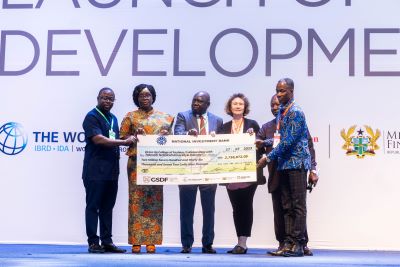The Ghana Skilled Development Fund (GSDF) has launched and disbursed more than GH₵100 million grant to some 105 enterprises.
$60m targeting 700 enterprises
The amount is part of a total of $60 million five-year grant, which seeks to support at least 700 enterprises to upgrade skills of their workforce for businesses in four windows.
The 4 Windows
The four windows are the formal sector, informal sector, innovation and green as well as science and technology.
GH₵800,000 for formal sector enterprises
Each beneficiary under window one (formal sector) has the opportunity to receive as much as GH₵800,000.
GH₵88,000 for informal sector enterprises
However, those in the informal sector have up to GH₵88,000.
GH₵1.2m for training innovation and green
However, beneficiaries under window three, which is the training innovation and green can access up to GH₵1.2 million.
GH₵2m for science and technology
For those under the last window, which is the science and technology can access up to GH₵2 million.
The five-year GSDF Project is also expected to provide about 42,000 direct jobs.
The fund, which is being implemented by the Commission for Technical Vocation Education and Training (CTVET) is a collaboration effort by the Government of Ghana with development partners to establish a competitive fund and forms part of the government’s overall strategy to promote industrialisation in the country.
The GSDF focuses on the provision of entrepreneurship and micro and small enterprise support for jobs and serves as the vehicle to operationalize the subcomponent of Ghana Jobs and Skill Project (GJSP).
It also aims at creating jobs and ensuring competitiveness of the skilled workforce; raise the income-earning capacities of people, especially women and low-income groups, through the provision of quality-oriented, industry-focused, and competency-based training programmes and complementary services.
Launching the fund in Accra, Deputy Minister of Education, Mrs Gifty Twum-Ampofo said government was applying a portion of a loan of $200 million from the International Development Association of the World Bank, towards the implementation of GSDF.
“We also hope that it will enable current employees to earn higher technical and vocational skills qualifications and incomes. And finally lead to upgrading the skills of master crafts-persons and self-employed graduate apprentices”, she emphasised.
She noted that the launch of GSDF was in fulfilment of President Nana Addo Dankwa Akufo Addo’s pledge to make Ghana a world class centre for skills development and a leading country in Technical and Vocational Education Training (TVET) delivery in Africa at the Centenary celebration of the Asuansi Technical Institute in 2017.
“In relation to this, the NPP Government over the past six years has worked to improve on governance and management by establishing CTVET and the TVET Service through the passing of Act 1023 and Act 1049 respectively to enhance quality, expand access, and increase funding for TVET,” she said.
Mrs Twum-Ampofo further stated that “We are consolidating our gains in the past years by keeping to our promise. We are taking conscious steps to make Ghana a centre of excellence in TVET in West Africa and to make Ghana globally competitive within the TVET ecosystem.
“This commitment is clearly shown in our quest to establish the Ghana Skills Development Fund which is being launched today and to develop policies that will drive positive changes within the sector,” she added.
On his part, the Director-General of CTVET, Dr Fred Kyei Asamoah said “this GSDF is part of government’s overall strategy to industrialize Ghana has as its objective to Create jobs and competitiveness of the skilled workforce and raise the income-earning capacities of people, especially women and low-income groups, through the provision of quality-oriented, industry-focused, and competency-based training programmes and complementary services”.
He explained that the GSDF was a challenge fund mechanism which addressed the skills needs of enterprises operating in both the formal and informal sectors of the economy of the country.
Ms Elena Glinskaya, Lead Economist at the World Bank, and Co-Task Leader, Ghana Jobs and Skills Project, described the GSDF as innovative and pledged the support of the World Bank to help Ghana build its human resource base for sustainable development.
The first cohort of beneficiaries received dummy cheques after successfully going through a thorough application and selection process and can start implementing their various concepts in earnest.
The next call for application would start from August 1-31, 2023 and all interested eneterprises can visit the GSDF website to apply for any of the four windows available.
This next call for applications will be preceded by an extensive sensitization and outreach programme in all the 16 regions of Ghana to create awareness about the fund and how one can apply.
32 state-of-the-art TVET centres
Work has commenced on the first phase of the 32 state-of-the-art TVET centres being constructed across the country.
Phase one comes at a cost of €158 million (€158,901,273).
The 32 state-of-the-art TVET institutions are aimed at increasing the employment rate of the youth in Ghana through the provision of skills training, especially in the rural areas.
It will also expand equitable access to public TVET institutions, targeting females and the rural poor, and equipping the youth with entrepreneurial skills.
Again, the centres will help retrain current workers who have skill gaps and imbibe in master craftsmen the aptitude for productivity and credibility.
Variety of infrastructure
All these institutions will be provided with a variety of infrastructure, including administration blocks, accommodation facilities and common areas, playing grounds, furniture, fittings and external works, tools and equipment for workshops, as well as information and communications technology (ICT) equipment.
Beneficiaries of Phase 1
The institutions under the first phase are made up of nine centres and will be located at Abrankese in Ashanti, Akyem-Awisa in Eastern, Boako in Western North, Kenyasi in Ahafo, Patuda in Bono East, Dambai in Oti, Salaga in Savannah, Guabuliga in the North-East and Tolibri in the Upper West Region.
In addition, there are new workshops (computer, electrical, electronic, building construction, mechanical), rehabilitation of buildings in two technical institutes (Abetifi and Don Bosco) and four senior high technical schools (Kyebi SHTS, Dagbon State SHTS, St George’s SHTS and GSTS), the construction of five new district TVET centres of excellence ongoing, with that of Anyinam and Pakyi No Two are near completion, while Assin Jakai in the Central Region, Akomadan and Manso Abore in the Ashanti Region will start soon.
Applied Technology Institute
TVET Service headquarters and Applied Technology Institute in Accra has been inaugurated as part of efforts to upgrade and modernise TVET education.
The facilities are constructed for more than $131.65 million and comprised administration blocks, classroom blocks, ICT centres and workshop equipment, as well as male and female dormitories.
Also 64 vehicles comprising 37 buses, 21 double cabin pick-ups, three Toyota Fortuner, two tractors and one Toyota V8 Landcruiser were handed over to the centre.
10 technical universities and 13 technical institutes
Also, the government has completed and inaugurated the rehabilitation and upgrading of 10 technical universities and 13 technical institutes, which include the construction of new workshops/laboratories and supply and installation of equipment fit for disciplines in electrical and electronics engineering, welding technology, automotive maintenance, civil engineering, and mechanical engineering.
Incubation centres
The management of the Ghana TVET Service, in collaboration with the sector ministry, is planning to construct three TVET incubation centres and 10 state-of-the-art TVET institutions across the country to serve as a final polishing phase for TVET graduates’ transition onto the job market.
These will be the first-ever TVET incubation centres to be established in the country.
45,000 students in TVET institutions
These investments resulted in a record-breaking enrolment of over 45,000 students in various programmes in TVET institutions across the country.
It is time Ghanaians turned around the fortunes of the country using TVET and technology for development.
- Have we reaped the whirlwind? - 19 April 2025
- Fighting cocaine with the cross - 18 April 2025
- Galamsey, Cocaine: of truths, errors and the priest - 18 April 2025

